During the coronavirus pandemic, most adult day centers and community senior centers have closed or cut their services, and families across the state have had to scramble to provide caregiver services at home. If you’re now caring for a loved one with memory or other health issues, follow these tips and find links to resources below.
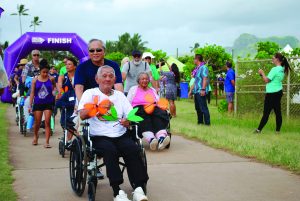 Tip 1: Stay healthy. Caregivers need to stay healthy in order to protect and take care of those with dementia. Taking care of yourself is as important for you as it is for your loved ones — without you, they will be even more vulnerable.
Tip 1: Stay healthy. Caregivers need to stay healthy in order to protect and take care of those with dementia. Taking care of yourself is as important for you as it is for your loved ones — without you, they will be even more vulnerable.
• Take breaks and find enjoyable things to do. Remember to take breaks, because this job is hard. Walk, swim or go running in a park.
• See if family members or others can help you. You really can’t do this alone. That could be family, calabash cousins or even hired help. You need to maintain that work-life balance in your life.
• Have meals and groceries delivered. Limit the quantity and duration of your shopping trips.
• Ask your primary care physician (PCP) to refill 90 days of medication rather than a 30-day supply. Have medications mailed to you for fewer trips and less worry.
• Seek support through groups. It’s important to talk to other people and other caregivers, especially during this time of social isolation. Look for events on the Alzheimer’s Association website.
 Tip 2: Plan ahead. If you’re the only person taking care of someone with memory issues, you need to create a backup plan for care for your loved one in case you get sick.
Tip 2: Plan ahead. If you’re the only person taking care of someone with memory issues, you need to create a backup plan for care for your loved one in case you get sick.
Tip 3: Advance Care Planning. This is very important. Talk with those with dementia about:
• Their wishes in case a life-threatening situation arises. For loved ones with dementia, it’s important to prepare ahead with advance-care planning. Write down what they want to happen if and when they get sick and may require hospitalization or hospice care.
• Healthcare power of attorney. It’s also important for patients with memory issues to designate someone they trust if they get sick and can’t make decisions for themselves. Ask your primary care physician for these forms or visit these websites: Kokua Mau (kokuamau.org), Prepare for Your Care (prepareforyourcare.org).
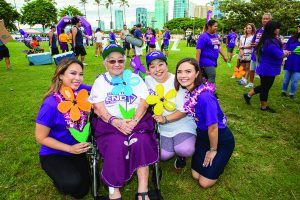 Tip 4: Keep in Close Contact. Social distancing is necessary during the COVID-19 pandemic, but social isolation is stressful for patients with dementia. Keep in close touch with your loved ones with dementia, especially if you’re not living with them. Loved ones may be feeling confused, and may not remember what’s going on or understand why their family can’t visit them if they’re in a care home. This can cause anxiety and sadness. So make regular phone calls; send emails to tech-savvy seniors. Mail or drop off care packages. Stop by to wave from the outside. Many facilities now have iPads to help residents connect with family members via Facetime, Zoom or Blue Jeans. Little things like these can make a loved one with dementia feel a lot better.
Tip 4: Keep in Close Contact. Social distancing is necessary during the COVID-19 pandemic, but social isolation is stressful for patients with dementia. Keep in close touch with your loved ones with dementia, especially if you’re not living with them. Loved ones may be feeling confused, and may not remember what’s going on or understand why their family can’t visit them if they’re in a care home. This can cause anxiety and sadness. So make regular phone calls; send emails to tech-savvy seniors. Mail or drop off care packages. Stop by to wave from the outside. Many facilities now have iPads to help residents connect with family members via Facetime, Zoom or Blue Jeans. Little things like these can make a loved one with dementia feel a lot better.
Tip 5: Maintain a Routine. It’s important to maintain a regular schedule for patients with dementia. They really thrive with a routine. Any kind of deviation may cause confusion, anxiety, agitation and mood changes. With social distancing restrictions, patients who used to go to senior centers suddenly can’t attend anymore. They may not understand why. Develop new routines to put them at ease.
Loved ones with dementia should wake up and go to bed at a regular time, and eat meals at the same time each day. You might also enhance your own routine by adding a regular daily walk or other activities.
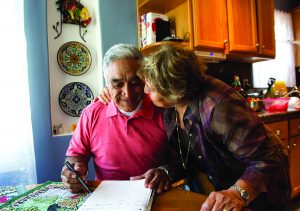 Tip 6: Keep Active. What kinds of things can you do to keep a loved one with dementia active? Take them on walks, and get fresh air and sunshine. That is really good for the mind and for the sleepwake cycle. Of course, wear a mask and keep a safe distance from other people. Be creative when planning home-based activities. Dust off old board games and play cards — there’s Monopoly, checkers, solitaire, poker and many other activities to chose from. Listening to music is also very therapeutic. Reading books engages the mind. Talking on the phone is a great way to socialize at this time.
Tip 6: Keep Active. What kinds of things can you do to keep a loved one with dementia active? Take them on walks, and get fresh air and sunshine. That is really good for the mind and for the sleepwake cycle. Of course, wear a mask and keep a safe distance from other people. Be creative when planning home-based activities. Dust off old board games and play cards — there’s Monopoly, checkers, solitaire, poker and many other activities to chose from. Listening to music is also very therapeutic. Reading books engages the mind. Talking on the phone is a great way to socialize at this time.
Tip 7: Eat Healthy. It’s important to maintain your energy that keeps you alert, mentally sharp and emotionally balanced.
• Eat a well-balanced diet. Eat a little bit of everything — fruits, vegetables, protein, dairy. It can be okay to have an occasional piece of cake —
a small portion is best.
• Consider using a meal delivery service. Meal delivery services can be lifesavers. Be sure to select well-balanced menu options.
• Limit canned, processed and prepared frozen foods. During this time, you might not be going to the grocery store as much, and you might have stocked up on a lot of spam, canned foods and frozen meals. Be cautious. A lot of these are high in salt. And if your loved one with dementia has a history of heart failure or heart problems, this is something to watch.
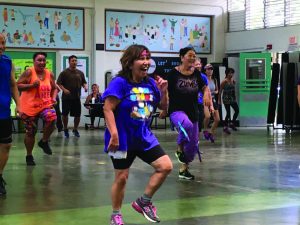 Tip 8: Calm Your Emotions. We’re all under a lot of stress, balancing a lot of things on our plate. So be aware that patients with dementia can really pick up on these emotions. That’s why it’s really important for caregivers to find ways to relax and de-stress themselves.
Tip 8: Calm Your Emotions. We’re all under a lot of stress, balancing a lot of things on our plate. So be aware that patients with dementia can really pick up on these emotions. That’s why it’s really important for caregivers to find ways to relax and de-stress themselves.
If you’re feeling anxious or angry or frustrated or worried, patients with dementia can pick up on that and react in destructive or challenging ways. If your loved one with dementia is feeling anxious, reassure him or her (and yourself) that things are going to be okay. Change the topic, turn on an old movie, go for a walk or have a snack. Distractions can help, but limit watching or reading the news.
Tip 9: Avoid Elder Abuse Scams. Check in with people with dementia to see if they are getting emails, mail or calls that are potential scams.
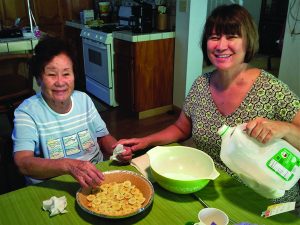 Tip 10: Call Your PCP if You Feel Sick. Don’t wait to take action because you are afraid to go to the doctor or emergency room. Many physicians are able to help you over the phone or via telemedicine. Take notes on your symptoms so you will have ready all the information your doctor may need during your call.
Tip 10: Call Your PCP if You Feel Sick. Don’t wait to take action because you are afraid to go to the doctor or emergency room. Many physicians are able to help you over the phone or via telemedicine. Take notes on your symptoms so you will have ready all the information your doctor may need during your call.


Leave a Reply